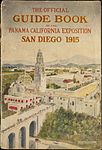Spreckels Organ Pavilion
Balboa Park (San Diego)Buildings and structures completed in 1914Buildings and structures in San DiegoCulture of San DiegoIndividual pipe organs ... and 2 more
Landmarks in San DiegoWorld's fair architecture in California

Spreckels Organ Pavilion houses the open-air Spreckels Organ in Balboa Park, San Diego, California. The Spreckels Organ is the world's largest pipe organ in a fully outdoor venue. Constructed for the 1915 Panama-California Exposition, it is located at the corner of President's Way and Pan American Road East in the park.
Excerpt from the Wikipedia article Spreckels Organ Pavilion (License: CC BY-SA 3.0, Authors, Images).Spreckels Organ Pavilion
Pan American Road East, San Diego Banker's Hill
Geographical coordinates (GPS) Address Nearby Places Show on map
Geographical coordinates (GPS)
| Latitude | Longitude |
|---|---|
| N 32.729391 ° | E -117.150452 ° |
Address
Spreckels Organ Pavillion
Pan American Road East
92101 San Diego, Banker's Hill
California, United States
Open on Google Maps











